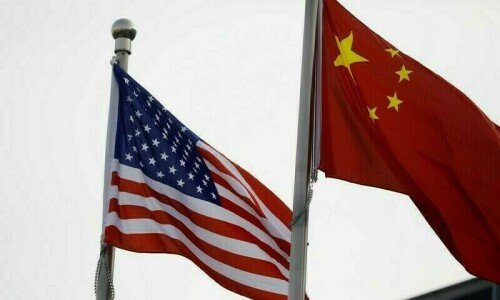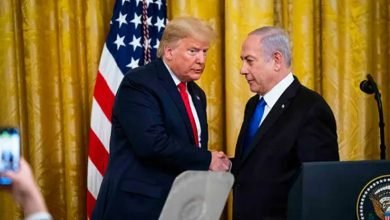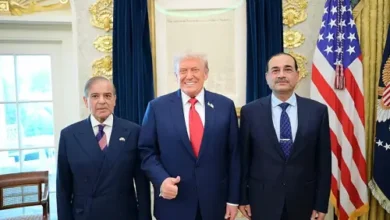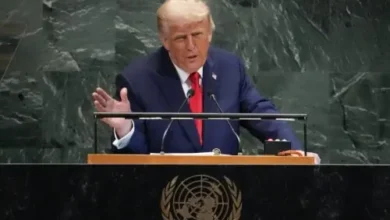Reciprocal tariff stopped for 90 days, China levies raised to 125pc by Trump

US President Donald Trump said on Wednesday he would pause many of his new tariffs for 90 days, even as he raised them further on imports from China.
Trump’s sudden reversal came less than 24 hours after steep new tariffs kicked in on imports from dozens of trading partners. The new trade barriers have hammered markets, raised the odds of recession and prompted retaliatory responses from China and the European Union.
Trump said he would raise the tariff on Chinese imports to 125 per cent from the 104pc level that took effect at midnight. At the same time, he said he would lower them on other countries also subject to his new targeted duties.
“I have authorised a 90-day pause, and a substantially lowered reciprocal tariff during this period, of 10pc, also effective immediately,” Trump wrote on social media. It is unclear how the move affects the European Union (EU) which earlier announced its own tariffs on US imports and goods
Earlier in the day, China and the EU announced new trade barriers on US goods in response to steep duties imposed by Trump, escalating a global trade war that has hammered markets and raised the likelihood of recession.
The EU said it would impose 25 per cent tariffs on a range of US imports in a first round of countermeasures. The 27-member bloc faces US tariffs of 20pc on most products and higher duties on autos and steel.
Countermeasures in Canada, a close US ally and major trading partner, also took effect today.
Targeted US duties on dozens of other countries, from Japan to Madagascar, also took effect, the latest in a thicket of tariffs that are unwinding a global trading order that has been in place for decades. Tariffs in the world’s largest consumer market now average above 20pc, according to various estimates, up from 2.5pc before Trump took office.
Trump’s punishing tariffs — which he says aim to end US trade deficits with many countries — have upended a global trading order in place for decades, raising fears of recession and wiping trillions of dollars off the market value of major firms.
Global markets took a pummelling today as Trump’s eye-watering 104pc tariffs on China came into effect, and a savage selloff in US bonds sparked fears that foreign funds were fleeing US assets.
Beijing has consistently opposed tariff rises and said earlier today it would take “firm and forceful” steps to protect its interests.
Its finance ministry later said in a statement that “additional tariff rates” on imports originating in the US would “rise from 34pc to 84pc”, effective from 12:01pm on Thursday.
“The tariff escalation against China by the US simply piles mistakes on top of mistakes [and] severely infringes on China’s legitimate rights and interests,” the ministry said.
Washington’s moves “severely damage the multilateral rules-based trade system”, it added.
Zhiwei Zhang, president and chief economist at Pinpoint Asset Management, said China “sent a clear signal today that the government will keep its stance on trade policies”.
“I don’t expect a quick and easy way out from the current trade conflict,” Zhang said, adding that “the damage to the two economies will become visible soon”.
“The outlook for international trade and global economic growth is highly uncertain.”
Beijing’s commerce ministry said in a separate statement that it would blacklist six US artificial intelligence firms, including Shield AI Inc. and Sierra Nevada Corp. The companies had either sold arms to Taiwan or collaborated on “military technology” with the island, the statement said.
Meanwhile, the EU will impose a 25pc duty on corn (maize) from April 15 in response to US steel and aluminium tariffs. US soybeans, which the EU imports in much bigger volumes than corn, will be subject to tariffs from December 1.
European countries mainly use corn to feed cattle, poultry and pigs. The retaliatory measures will price US corn out of European markets where buyers have scooped up abundant and cheap US supplies this season.
US Treasury Secretary Scott Bessent, in an interview with Fox Business Network, said China’s new tariffs were unfortunate.
“They have the most imbalanced economy in the history of the modern world, and I can tell you that this escalation is a loser for them,” he said.
This week has already brought crisis-era volatility to markets, wiping trillions of dollars off the value of stocks and hammering commodities and emerging markets.
Shares of big US banks fell pre-market, extending tariffs-induced losses after China announced its 84pc tariffs on US goods. Oil prices extended their four-year lows.
“The US and China are stuck in an unprecedented, and expensive, game of chicken, and it seems that both sides are unwilling to back down,” said Ting Lu, chief China economist at Nomura.
Trump had nearly doubled duties on Chinese imports, which had been set at 54pc last week, in response to previous counter-tariffs from Beijing.
The White House had no immediate comment on China’s latest retaliatory move.
Earlier today, China called its trade surplus with the US an inevitability and warned it had the “determination and means” to continue the fight if Trump kept hitting Chinese goods.
China’s currency has faced heavy downward pressure, with the offshore yuan at record lows due to the tariffs. But sources told Reuters that the central bank has asked major state-owned banks to reduce US dollar purchases and would not allow sharp yuan declines.
Meanwhile, China told the World Trade Organisation (WTO) that the US tariffs threatened to further destabilise global trade.
“The situation has dangerously escalated. … As one of the affected members, China expresses grave concern and firm opposition to this reckless move,” China said in a statement to the Geneva-based WTO today that was sent to Reuters by the Chinese mission to the WTO.
Trump urges firms to move to US ‘now’ to avoid tariffs
Trump urged companies to immediately begin relocating to the US to avoid tariffs, hours after his trade war escalated with steep duties going into effect.
“This is a great time to move your company into the United States of America, like Apple, and so many others, in record numbers, are doing,” Trump posted on his Truth Social platform, promising “zero tariffs” and “no environmental delays”.
“Don’t wait, do it now!” he urged.
Market rout
Since Trump unveiled his tariffs on April 2, the S&P 500 has suffered its deepest loss since the benchmark’s creation in the 1950s. It is now nearing a bear market, defined as 20pc below its most recent high.
US Treasuries were also caught up in the market turmoil and extended heavy losses today in a sign investors are dumping even their safest assets, and the dollar, a traditional safe haven, was weaker against other major currencies.
European shares fell and US stock futures pointed to more pain ahead, following a grim session for most of Asia.
Trump has shrugged off the market rout and offered investors mixed signals about whether the tariffs will remain in the long term, describing them as “permanent” but also boasting that they are pressuring other leaders to ask for negotiations.
European Union countries are expected to approve the bloc’s first countermeasures against Trump’s tariff barrage today, joining China and Canada in pushing back.
The European Commission, which coordinates EU trade policy, has proposed extra duties, mostly of 25pc, on US imports ranging from motorcycles, poultry, fruit, wood, and clothing to dental floss, according to a document seen by Reuters.
They are to enter into force in stages.
China seeks to ‘tariff-proof’ economy as trade war deepens
China is trying to tariff-proof its economy by boosting consumption and investing in key industries, but analysts say it remains critically vulnerable to the economic storm triggered by Trump’s 104pc levies on its goods.
Beijing has vowed to “fight to the end” against Trump’s aggressive trade policy, with number two leader Li Qiang saying authorities were “fully confident” in the resilience of the Chinese economy.
But even before the tariffs hit, weakness in the post-Covid domestic market, rising unemployment and a long-running property crisis had all dampened consumption.
“The Chinese economy has been significantly weakened since Trump’s first term and can’t really withstand the impact of sustained high tariffs,” said Henry Gao, an expert on the Chinese economy and international trade law.
Overseas shipments represented a rare bright spot last year, with the US as the top single-country buyer of Chinese goods. US figures put Chinese exports to the US at around $440 billion in 2024, almost three times the $145bn worth of imports.
Machinery and electronics — as well as textiles, footwear, furniture and toys — make up a majority of the goods sent, and a supply glut could squeeze already crowded domestic consumer markets.
Although China’s domestic market is stronger now than in Trump’s previous term, there would inevitably be pain ahead, said Tang Yao from Peking University’s Guanghua School of Management.
“Certain products are specifically designed for American or European markets, so efforts to redirect them to domestic consumers will have only a limited effect,” he said.
‘Strategic opportunity’
However, a weekend editorial in the Communist Party-backed People’s Daily described the tariffs as a “strategic opportunity” for China to cement consumption as the main driver of economic growth.
We must “turn pressure into motivation”, it read.
Beijing has been seeking to “recast structural external pressure as a catalyst for long-intended reforms”, said Lizzi Lee from the Asia Society Policy Institute’s Centre for China Analysis. Authorities are “projecting confidence”, she said.
China’s quick and coordinated response to tariffs reflects lessons learned from Trump’s first term, she added.
For example, in addition to readying reciprocal tariffs on US goods set to come into effect on Thursday, Beijing’s commerce ministry the same day announced export controls on seven rare earth elements, including ones used in magnetic imaging and consumer electronics.
Beijing’s response to any further escalation may no longer be confined to tit-for-tat levies, as China is “refining its retaliatory approach”, Lee said.
Since Trump’s first term, China has diversified and fortified relationships with countries in Europe, Africa, Southeast Asia and Latin America, as well as South Korea and Japan.
Beijing could also expand government support for the private sector as entrepreneurs fall back into President Xi Jinping’s good graces, added ANZ’s Raymond Yeung.
China’s leaders have been trying to promote domestic self-reliance in technology for some time, offering explicit support and reinforcing supply chains in key areas like AI and chips.
Trump has insisted the ball was in China’s court, saying Beijing “wants to make a deal, badly, but they don’t know how to get it started”.
Late on Tuesday, Trump also said the US would announce a major tariff on pharmaceuticals “very shortly”.
Separately, Canada said that its tariffs on certain US auto imports will come into force today.
‘No real protection’
While this time round Beijing has more experience with Trump, it “doesn’t mean the Chinese economy can easily shake off the effects of soaring tariffs”, said Frederic Neumann, chief Asia economist at HSBC.
Authorities will be looking to quickly offset falling US demand for Chinese goods, he said.
That could look like trade-in schemes or more consumer subsidies that make it easier for Chinese shoppers to buy common household items, from water purifiers to electric vehicles.
“By creating demand and trade opportunities for China’s partners in Asia and Europe, the country could help shore up what’s left of the liberal global trading order,” Neumann said.
But whether or not Beijing can do that is yet to be seen.
The government has “been very reluctant to introduce real consumption stimulus, which is why there’s such low confidence in any so-called consumption-boosting measures”, Gao said. “I don’t think China has any real protection against a trade war,” he added.
Success also goes beyond words and ultimately hinges on Beijing’s ability to deliver the long-awaited consumption boost, HSBC’s Neumann warned.
“This is China’s moment to seize economic leadership of the world,” he said. “But that leadership will only come about if domestic demand rebounds and fills the void left by an absent US.”



